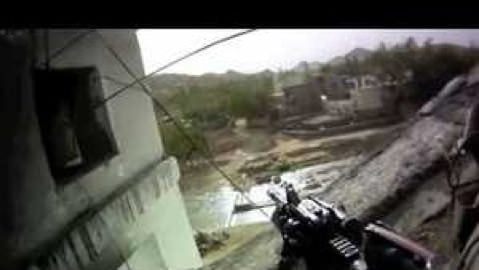Find Our Latest Video Reviews on YouTube!
If you want to stay on top of all of our video reviews of the latest tech, be sure to check out and subscribe to the Gear Live YouTube channel, hosted by Andru Edwards! It’s free!
Monday May 2, 2011 1:55 pm
9/11 through bin Laden’s death: How tech has changed over the years

Osama Bin Laden's death is a clear victory in the war on terror for the U.S., but as someone who was working in New York City on September 11, 2001, this event also highlights just how much has changed in the world of technology, communication and news dissemination in the last 10 years.
Nearly a decade ago, I marveled at how technology allowed us to not only learn about the attack on the World Trade Center, but experience it as it unfolded. Back then, I relied heavily on AOL's Instant Messenger to communicate with my team in the office and those scattered around the country. As a result, AIM was a constant presence on my desktop and it's through that platform that I learned of the first jet hitting one of the towers. With that distressing information in hand, our staff gathered in a conference room to watch TV news on a larger projection TV. As a result, we all witnessed the second plane hit the other tower and knew we were under attack.
I used AIM throughout the day to stay in touch with family, friends, and co-workers. Most of my news updates, however, were delivered via TV and radio. There was no Google News, no Facebook, no Twitter, or YouTube for anyone to post eyewitness accounts.
Last night, much of the world learned of Osama bin Laden's death hours before President Barack Obama announced it in a televised news conference at roughly 11:35pm Eastern. Back in 2001, those sharing news about the airplane hitting one of the World Trade Center towers were simply repeating what they had seen on local television networks. Real news was rarely traded on the point-to-point instant messaging service. In fact, there was no concept of a viral network or participants simply sharing what they were experiencing to a wider group without thought of import or impact.
As many of you by now know, the initial raid on Osama Bin Laden's compound was inadvertently "reported" on Twitter by Pakistani IT consultant Sohaib Athar, who lived near Osama's compound. Athar had fairly pedestrian concerns. The raid (he had no idea it was such) was noisy and he tweeted that he just wanted some "peace and quiet." Eventually, someone within the network informed him some hours later that he was "live-tweeting" the raid.
Live-Tweeting, basically a form of Twitter-based, on-the-scene (or at least watching the scene unfold) reporting, is another concept that didn't exist a decade ago. Reporting is nothing new, but Twitter and Facebook now provide a platform for citizen journalism by anyone, even those who don't know what they're reporting. In the hours leading up to President Obama's speech, a former government official also leaked the news of bin Laden's killing. We've come a long way since the days when "Deep Throat" would deliver a hard-copy packet of information to a Washington Post reporter, who would then produce an investigative report weeks, or even months, later.
Following the attacks on 9/11, thousands of people in New York City streamed downtown to try and help, but aside from emergency workers, average citizens did not mobilize for hours, even a full day, after the initial attacks. Last night, spontaneous celebrations erupted in Washington, as well as Times Square and Ground Zero in New York. I can only guess that many of those people reacted to news delivered to them via cell phone, text message, Twitter, and mobile access to ever-present news sources like Google News.
I remember thinking, in 2001, how technology had played such a crucial role in the day, but now I realize that it was simply the beginning. Broadband, ubiquitous and mobile connectivity, and social networking have radically reshaped our society since 2001. We have proof that information will reach us at lightning speed. There are no barriers it cannot traverse and no instrument through which it cannot travel.
Yesterday, the U.S. closed a chapter in the war against terror, but for technology, it's just turning another page.
This article, written by Lance Ulanoff, originally appeared on PCMag.com and is republished on Gear Live with the permission of Ziff Davis, Inc.
Latest Gear Live Videos
Advertisement
Advertisement
Advertisement
© Gear Live Inc. {year} – User-posted content, unless source is quoted, is licensed under a Creative Commons Public Domain License. Gear Live graphics, logos, designs, page headers, button icons, videos, articles, blogs, forums, scripts and other service names are the trademarks of Gear Live Inc.











